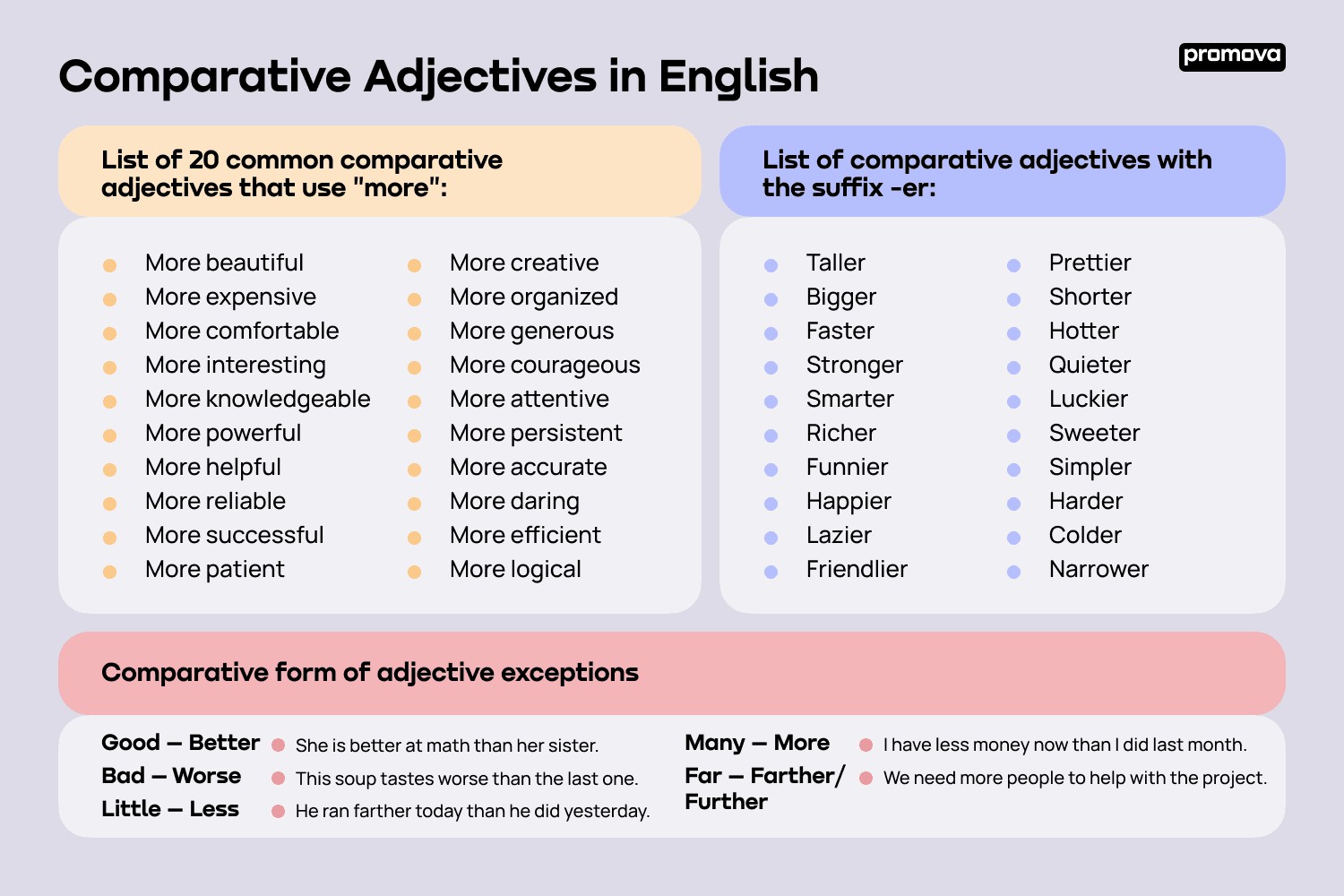If you are looking to enhance your English language skills, especially when learning English online, understanding comparative adjectives is crucial. These adjectives are essential for making detailed comparisons, allowing you to express yourself more clearly and effectively. This article will guide you through the world of comparative adjectives, providing clear examples and, most importantly, an invaluable Comparative List to boost your English fluency.
What are Comparative Adjectives?
A comparative adjective, by definition, is used to compare two nouns – whether they are people, places, things, or ideas. It highlights the difference in a specific quality between these two entities. For instance, instead of simply saying “This car is fast,” you can use a comparative adjective to say “This car is faster than that truck,” providing a more detailed and understandable description.
Comparative adjectives are fundamental in everyday English conversations. They allow us to discuss and differentiate between physical attributes, personality traits, and a wide range of other qualities.
The formation of comparative adjectives generally depends on the length of the base adjective. For shorter adjectives, typically those with one syllable, we add the suffix “-er.” Take “small,” for example; its comparative form is “smaller.”
However, for adjectives with two or more syllables, we typically use the word “more” before the adjective rather than adding “-er.” Therefore, “beautiful” becomes “more beautiful,” and “intelligent” becomes “more intelligent.” Understanding this rule is key to correctly using comparative adjectives.
Extensive Comparative Adjectives List
To make learning easier and more practical, here is an expanded comparative list of common comparative adjectives, categorized for your convenience. This list is designed to be a helpful resource as you learn and practice using comparisons in English.
Common “-er” Comparative Adjectives
This section of our comparative list focuses on adjectives that form their comparative by adding “-er.”
- Taller
- Bigger
- Faster
- Stronger
- Smarter
- Richer
- Funnier
- Happier
- Lazier
- Friendlier
- Prettier
- Shorter
- Hotter
- Quieter
- Luckier
- Sweeter
- Simpler
- Harder
- Colder
- Narrower
- Younger
- Older
- Thinner
- Wider
- Brighter
- Darker
- Lighter
- Heavier
- Softer
- Louder
Common “More” Comparative Adjectives
The following is a segment of our comparative list showcasing adjectives that use “more” to form their comparative.
- More beautiful
- More expensive
- More comfortable
- More interesting
- More knowledgeable
- More powerful
- More helpful
- More reliable
- More successful
- More patient
- More creative
- More organized
- More generous
- More courageous
- More attentive
- More persistent
- More accurate
- More daring
- More efficient
- More logical
- More important
- More significant
- More complex
- More difficult
- More convenient
- More modern
- More traditional
- More impressive
- More effective
- More suitable
 A list of comparative adjectives categorized by -er and more rules, along with irregular forms.
A list of comparative adjectives categorized by -er and more rules, along with irregular forms.
Comparative Adjective Examples in Sentences
Seeing comparative adjectives in action can solidify your understanding. Here are some examples using adjectives from our comparative list:
- My younger sister is smarter than me in mathematics.
- This silk dress is undeniably more fashionable than that cotton one.
- For daily commutes, his electric car is faster off the mark than mine.
- Visiting that new diner, I found their burgers have tastier patties than the old one downtown.
- She is more outgoing and sociable than her introverted brother.
- The latest comedy release was funnier than any movie I expected this year.
- Among all options, this new laptop is more reliable for heavy tasks than the older model.
- For a quick clean, a simple cloth is more effective than using harsh chemicals.
As demonstrated, comparative adjectives from our list effectively compare various attributes – from physical characteristics to personality and functionality.
Exceptions to Comparative Forms
No grammar rule is without its exceptions, and comparative adjectives are no different. These irregular forms, while few, are crucial to learn and are included in our comprehensive comparative list for completeness.
- Good – Better
- Bad – Worse
- Far – Farther/Further
- Little – Less
- Many – More
Here are sentences showcasing these exceptions:
- She is better at playing the piano than her cousin.
- Unfortunately, this burnt coffee tastes worse than the one I made yesterday.
- He decided to run farther into the woods today than he previously dared.
- After the sale, I have less money in my account now than I anticipated.
- To manage the event effectively, we urgently need more volunteers to help.
Common Comparison Mistakes
Avoiding common errors will refine your English. Keep these points in mind to ensure correct usage of comparative adjectives, and remember to review our comparative list to reinforce accurate forms.
- Incorrect Form: A frequent mistake is using “more” with short adjectives or incorrectly adding “-er” to longer ones. Avoid saying things like, “He is more taller” – the correct form is “He is taller.”
- Missing “than”: Comparisons require “than” to connect the two items being compared. Saying “He is taller his brother” is grammatically incorrect; it should be “He is taller than his brother.”
- Superlative vs. Comparative Confusion: When comparing more than two items, superlatives (like “tallest”) are used, not comparatives. Avoid “He is the tall boy in the class” when you mean “He is the tallest boy in the class.”
- Overuse of Comparisons: While comparisons are useful, overuse can dilute your writing or speech. Instead of “He is more intelligent than all students, and also more hardworking and more punctual,” consider “He is exceptionally intelligent, hardworking, and punctual, setting him apart from his peers.”
Summary
Understanding comparative adjectives and utilizing a reliable comparative list are vital steps in mastering English comparisons. They enable you to express differences clearly and add depth to your communication. Remember the basic rules, exceptions, and common mistakes highlighted in this guide. By practicing with the provided comparative list and examples, you’ll significantly enhance your English proficiency and speak with greater precision and confidence. Continue to explore and practice to truly master this essential aspect of English grammar!
